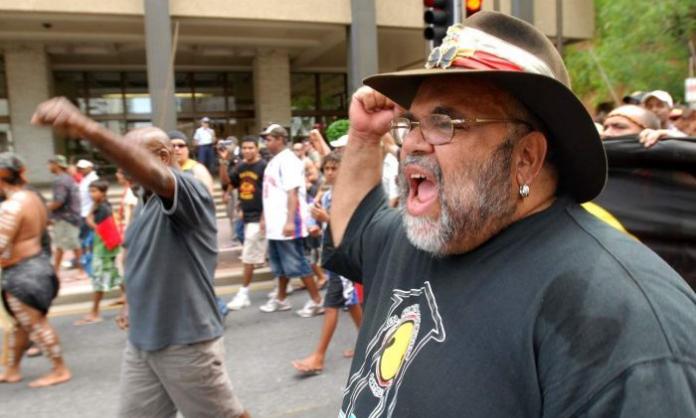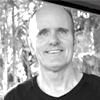Aboriginal activist Sam Watson died yesterday at the age of 67. A lifelong fighter and radical much beloved by the Murri community, Sam’s passing also leaves a huge gap on the Brisbane left, of which he was a mainstay for many decades. As a proud Wangerriburra and Birri Gubba man with blood ties to the Jagara, Kalkadoon and Noonuccal Peoples, Sam was a warrior in the fight for Indigenous rights and against racism.
Growing up in the deeply racist state of Queensland, Sam threw himself into political action at a young age, joining the campaign for a ‘yes’ vote in the 1967 referendum while still a teenager. The campaign was not limited to having Aboriginal people included on the census; it was an historic part of the Indigenous struggle for equal access to healthcare and education and against entrenched inequality, oppression and police violence. That struggle continues.
When he commenced his studies at the University of Queensland in 1971, Sam was the only Aboriginal student on campus. The director of native affairs, the state bureaucrat responsible for overseeing the apartheid conditions Indigenous people were subjected to in Queensland, pulled him into a meeting to warn him off getting involved with the anti-Vietnam war movement. Sam told Green Left Weekly in 2001 that “it only took me about six months to link up with the radicals”. He became a leading activist in the student radicalisation of the time and a key participant in the solidarity campaign against South African apartheid.
Sam was a stalwart of the campaign against the Bjelke-Petersen government’s offensive against Indigenous rights, civil liberties and the left throughout the 1970s. He was active at the 1972 Aboriginal Tent Embassy in Canberra and was a co-founder, with Denis Walker, of the Australian Black Panther Party – which set up its headquarters in Brisbane in 1971 to demand Indigenous rights and confront racist police harassment.
Sam was for decades a tireless fighter against black deaths in custody and for justice for the families and communities of Indigenous people murdered by cops. Fittingly, he dubbed the Queensland police system a “stinking swamp of racism”. In 1993, he led big marches in Brisbane demanding justice for the family of Daniel Yock, who was killed by police near Musgrave Park. In 2004, he led the campaign in Brisbane to hold the cops to account for the murder in custody of Mulrunji Doomadgee on Palm Island. And in November this year, he spoke at the rally for justice for Kumanjayi Walker, who was shot to death by a cop in his NT community of Yuendumu.
Sam’s commitment to the fight against police brutality was reflected in his work for the Aboriginal and Torres Strait Islander Legal Service and Murri Watch. He frequently took a stand for Indigenous people locked up for nothing other than being Aboriginal. Just months ago, Sam led protests against the lengthy incarceration of dozens of Aboriginal children, some as young as 10 years old, in the Brisbane watch house.
Sam always challenged the whitewashed history of this blood-soaked country. He told the stories of the massacres but also of the resistance. Every year, he organised a memorial in Brisbane for Dundalli, the Aboriginal resistance fighter hanged in Brisbane in 1855. But perhaps his greatest legacy is the Invasion Day rallies in Brisbane. For many years, Sam called rallies protesting the disgusting ritual that is “Australia Day”. They were attended by only a few hundred and routinely ignored in the media. Today they have become many thousands strong and, with more than 100,000 coming out across the country, have helped to normalise the idea among millions that the national holiday is something to be ashamed of, not celebrated. The job of abolishing this celebration of genocide is not yet done but, as his family writes: “It is his family’s hope that the Invasion Day rallies will continue to grow each year, because we know that he will be there in spirit”.
Sam was a committed and principled fighter for social justice on every front. He lived by the maxim “an injury to one is an injury to all”. His presence could always be counted on at demonstrations big or small, whether for refugee rights or the rights of Palestinians, against Islamophobia and the far right, or speaking out against Donald Trump. Wherever there was injustice, Sam stood against it, giving real meaning to the word solidarity.
Sam was a member of Socialist Alliance and stood for the Alliance in several state and federal elections. He was also a good friend of Socialist Alternative in Brisbane over the years. Many young radicals learnt much of the history of genocide and Aboriginal resistance in Queensland from Sam, whether from his speeches at rallies or in private conversations. Sam was always ready to offer invaluable advice or to lend an ear when we were working out how to handle the kinds of tactical issues that come up in any campaign. He also supported our efforts to build a bigger socialist voice in Brisbane, joining a panel of other 1970s veterans to open our Brisbane centre in 2012, and was a supporter of Red Flag newspaper. All of us are feeling his loss terribly today and convey our sincere condolences to his partner Catherine and all his family.
Vale Sam Watson, a noble and determined fighter against oppression in all its guises, who dedicated his life and self to his community and struggle, and whose example will continue to inspire future generations of radicals and activists.









